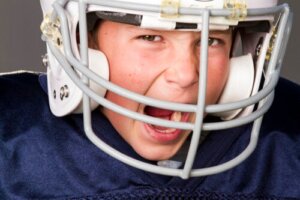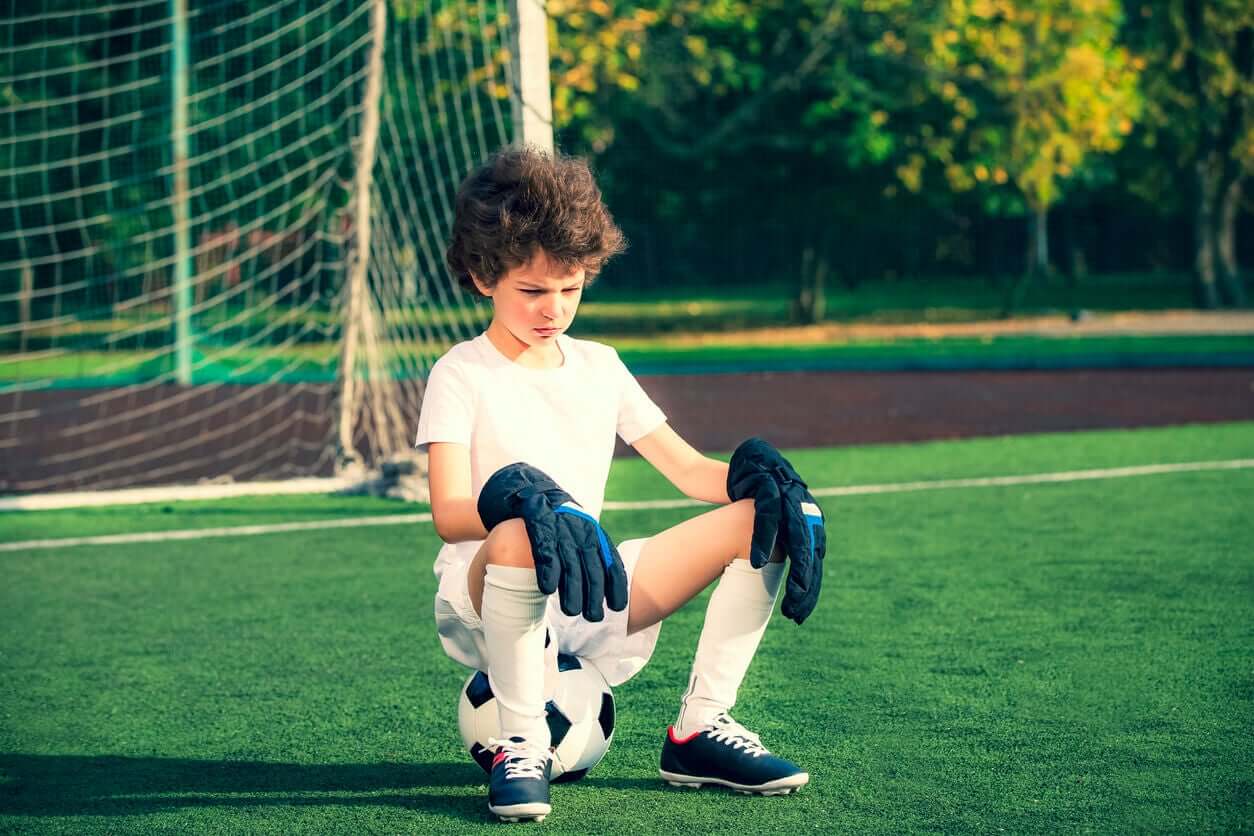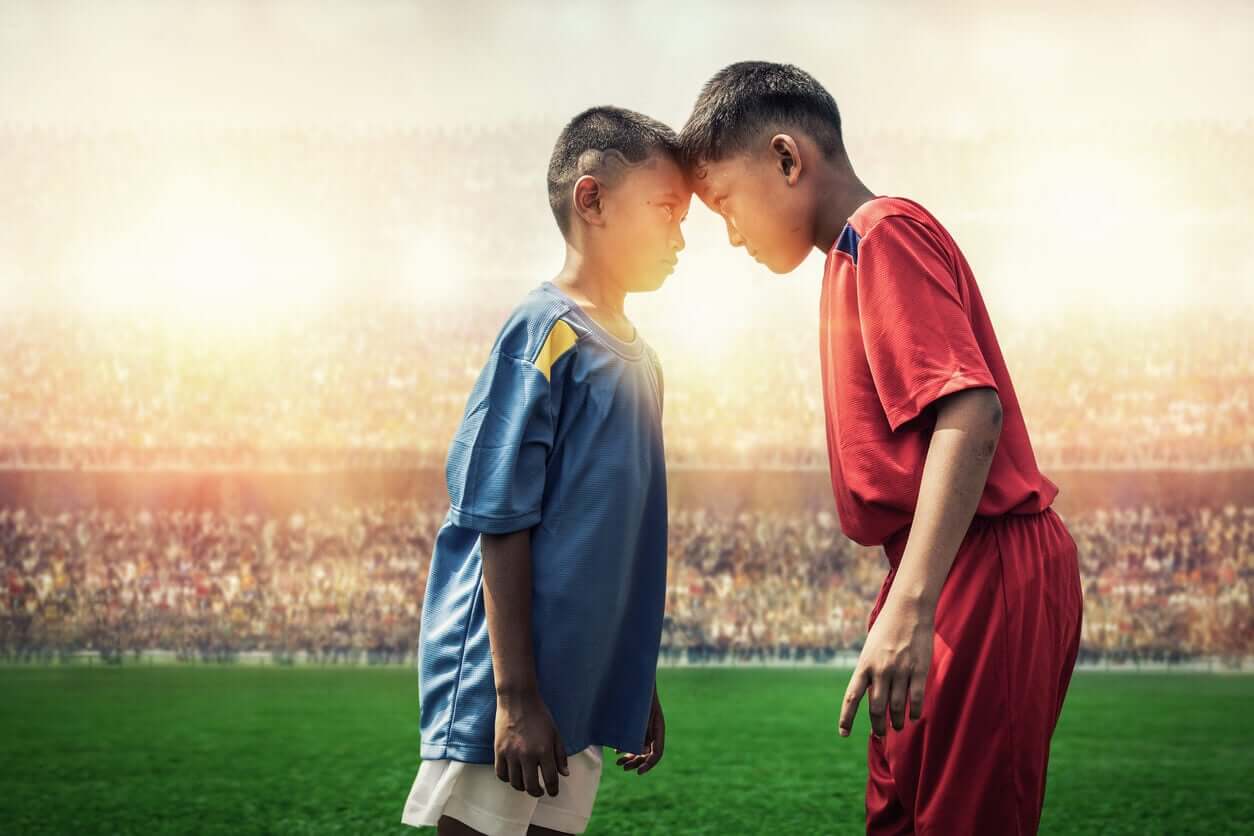What Is Sports Anger and How Does It Affect Children

Have you heard of sports anger? Do you think your children have ever felt it? It’s possible, as all emotions are part of human nature and no person is alien to them. Much less children.
As a mother, you must understand that your children need to experience all kinds of emotions and sensations throughout their lives. Limiting them solely to happiness can be quite counterproductive.
For this reason, we want to explain to you how to handle those episodes of sports anger so that you can accompany your child in the best possible way.
What is anger?
Generally speaking, anger is one of the most common feelings in humans. It’s a primary emotion, which arises when we’re unable to achieve our goals. It usually manifests itself through irritability or indifference towards people in the environment.
Many circumstances can trigger anger, even the simplest issues in life, as each person has a different threshold for their emotions.
In turn, this applies to both adults and children, and it’s key to teach kids to recognize feelings from childhood.
You may be interested in: How to Help Children Channel Their Anger
Sports anger in children

Anger appears in any context of A child’s life: In daily activities within the home, school, or at the gym.
The sports field is an environment that’s conducive to anger and frustrations, as, in it, we constantly face challenges and the possibility of losing or failing.
In children, sports anger isn’t much different than in adults, but children may not fully understand the type of feeling they’re dealing with.
Regardless of the sports discipline, anger is the order of the day. The first few times, this emotion can arise from traumatic events that the child wasn’t able to deal with. But with the passing of time and the correct accompaniment, it’s possible for them to control it.
Does anger affect children?
A desire for destruction often accompanies episodes of anger and is frequently the cause of arguments or fights.
Sports anger definitely affects children, to a greater or lesser extent. Verbal or physical assaults, both toward themselves and toward peers, are a perfect example of this.
Beyond motivating violence, sports anger also affects sports performance, as it leads to difficulty concentrating and losing the desired direction in sports.
Parents and sports anger
In most cases, parents are the main culprits for their children’s anger mismanagement. Many times, it’s about overprotective parents, who do whatever it takes to make sure their children live in a world of happiness and comfort.
We advise you not to create a protective bubble in the lives of your children because, when it bursts, it can be quite dangerous.
Try to accompany your children so that they learn to recognize, accept, and express their emotions. And with regard to anger, look at what triggers it and what resources they have to handle it.
According to a study published in the European Scientific Journal, children manifest anger through irritability and aggressive responses. So then, through these behaviors, you can identify their anger more easily.
A good way to guide children is to encourage these types of episodes to occur in the context of the home. Take advantage of controlled environments and teach your children to recognize their own limits and to find a way to channel their emotions in a healthy way to calm down.
With the passing of time, your little ones will be able to transfer this learning to the sport environment. You mustn’t forget that it’s hard and intense work, in which your patience will be put to the test.
Learn more: What Are the Best Sports for Children?
Sports anger, something you should take advantage of
Regardless of what type of emotion children experience, labeling them as good or bad at the outset is a mistake. Emotions exist to be lived and each one of them has a valid meaning.
With regard to sports anger, many athletes usually take advantage of it as a motivational stimulus to improve their athletic performance.
According to a study on combat sports, sports anger is a fundamental component within the practice in order to improve results. However, it’s good to change the term anger to sport intensity, to avoid its negative connotation.
It’s important to note that sports anger in children should focus on children themselves and not on the opponent. Competition with third parties moves to second place during childhood.

Sports anger, professional and social support
As a mother, you should be the first person to support and teach your children how to deal with sports anger. But, in addition, there are other human resources that can be of great help.
Family members, friends, and close people should function as a second line of support for raising children.
Last but not least, professional support should be taken into account when the child’s environment doesn’t have enough tools to teach the child to control their anger.
Remember that emotions shouldn’t be taken lightly, especially in a stage as sensitive as childhood.
Have you heard of sports anger? Do you think your children have ever felt it? It’s possible, as all emotions are part of human nature and no person is alien to them. Much less children.
As a mother, you must understand that your children need to experience all kinds of emotions and sensations throughout their lives. Limiting them solely to happiness can be quite counterproductive.
For this reason, we want to explain to you how to handle those episodes of sports anger so that you can accompany your child in the best possible way.
What is anger?
Generally speaking, anger is one of the most common feelings in humans. It’s a primary emotion, which arises when we’re unable to achieve our goals. It usually manifests itself through irritability or indifference towards people in the environment.
Many circumstances can trigger anger, even the simplest issues in life, as each person has a different threshold for their emotions.
In turn, this applies to both adults and children, and it’s key to teach kids to recognize feelings from childhood.
You may be interested in: How to Help Children Channel Their Anger
Sports anger in children

Anger appears in any context of A child’s life: In daily activities within the home, school, or at the gym.
The sports field is an environment that’s conducive to anger and frustrations, as, in it, we constantly face challenges and the possibility of losing or failing.
In children, sports anger isn’t much different than in adults, but children may not fully understand the type of feeling they’re dealing with.
Regardless of the sports discipline, anger is the order of the day. The first few times, this emotion can arise from traumatic events that the child wasn’t able to deal with. But with the passing of time and the correct accompaniment, it’s possible for them to control it.
Does anger affect children?
A desire for destruction often accompanies episodes of anger and is frequently the cause of arguments or fights.
Sports anger definitely affects children, to a greater or lesser extent. Verbal or physical assaults, both toward themselves and toward peers, are a perfect example of this.
Beyond motivating violence, sports anger also affects sports performance, as it leads to difficulty concentrating and losing the desired direction in sports.
Parents and sports anger
In most cases, parents are the main culprits for their children’s anger mismanagement. Many times, it’s about overprotective parents, who do whatever it takes to make sure their children live in a world of happiness and comfort.
We advise you not to create a protective bubble in the lives of your children because, when it bursts, it can be quite dangerous.
Try to accompany your children so that they learn to recognize, accept, and express their emotions. And with regard to anger, look at what triggers it and what resources they have to handle it.
According to a study published in the European Scientific Journal, children manifest anger through irritability and aggressive responses. So then, through these behaviors, you can identify their anger more easily.
A good way to guide children is to encourage these types of episodes to occur in the context of the home. Take advantage of controlled environments and teach your children to recognize their own limits and to find a way to channel their emotions in a healthy way to calm down.
With the passing of time, your little ones will be able to transfer this learning to the sport environment. You mustn’t forget that it’s hard and intense work, in which your patience will be put to the test.
Learn more: What Are the Best Sports for Children?
Sports anger, something you should take advantage of
Regardless of what type of emotion children experience, labeling them as good or bad at the outset is a mistake. Emotions exist to be lived and each one of them has a valid meaning.
With regard to sports anger, many athletes usually take advantage of it as a motivational stimulus to improve their athletic performance.
According to a study on combat sports, sports anger is a fundamental component within the practice in order to improve results. However, it’s good to change the term anger to sport intensity, to avoid its negative connotation.
It’s important to note that sports anger in children should focus on children themselves and not on the opponent. Competition with third parties moves to second place during childhood.

Sports anger, professional and social support
As a mother, you should be the first person to support and teach your children how to deal with sports anger. But, in addition, there are other human resources that can be of great help.
Family members, friends, and close people should function as a second line of support for raising children.
Last but not least, professional support should be taken into account when the child’s environment doesn’t have enough tools to teach the child to control their anger.
Remember that emotions shouldn’t be taken lightly, especially in a stage as sensitive as childhood.
All cited sources were thoroughly reviewed by our team to ensure their quality, reliability, currency, and validity. The bibliography of this article was considered reliable and of academic or scientific accuracy.
- Oliva Mendoza, F., Calleja Bello, N., & Hernández Pozo, R. (2012). Escala de creencias sobre la ira en el deporte de combate con atletas Mexicanos. Revista Internacional de Medicina y Ciencias de La Actividad Fisica y Del Deporte. http://cdeporte.rediris.es/revista/revista45/artescala276.pdf
- Ortega-Andrade, N. A., Viramontes-Martínez, L. M., & Jiménez-Rodríguez, D. (2021). El enojo desde la perspectiva de un grupo de niños y niñas mexicanos. European Scientific Journal ESJ. https://doi.org/10.19044/esj.2021.v17n5p51
This text is provided for informational purposes only and does not replace consultation with a professional. If in doubt, consult your specialist.








